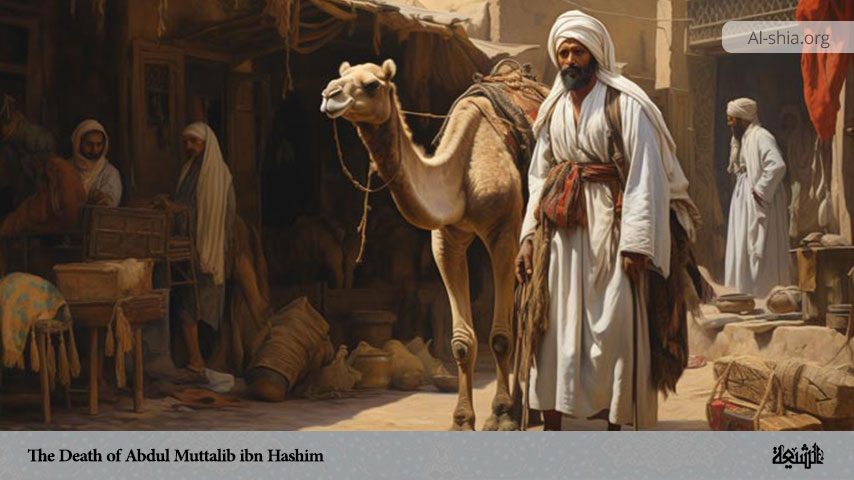Abdul Muttalib ibn Hashim ibn Abdul Manaf (b. 127 before Hijra/498-9 – d. 45 BH/578) was the paternal grandfather of Prophet Muhammad (peace be upon him and his family) from the Quraysh tribe and an offspring of Hashim, thus related to the Banu Hashim. His mother, Salma, daughter of Amr, is from the Banu Najjar of the Khazraj clan in Yathrib (later called Medinah).
Before the birth of Abdul Muttalib, his father, Hashim traveled to Gaza (present-day Palestine) and died and was buried there. Abdul Muttalib was born in Yathrib 127 before Hijra/498-9 and lived with his mother in Medina for seven years or more. Thereafter, he was taken by his uncle Muttalib ibn Abdul Manaf to Mecca at his childhood age. Upon first arriving in Mecca, the people assumed the unknown child was Muttalib’s servant and started calling him Abdul Muttalib (“servant of Muttalib”). His real name was “Shayba” meaning ‘the ancient one’ or ‘white-haired’ because of the streak of white through his jet-black hair, and is sometimes also called Shaybah al-Ḥamd (“The white streak of praise”).
When Muttalib died, Shayba succeeded him as the chief of the Hashim clan. Just like his uncle, Abdul Muttalib took over the duties of providing the pilgrims with food and water and carried on the practices of his forefathers with his people. He attained such eminence as none of his forefathers enjoyed; his people loved him and his reputation was great among them. He became the chief of the Quraysh tribe and also one of the nobles of Mecca.
According to Al-Ya’qubi: “Abd al-Muttalib was an unparalleled noble of Quraysh in those days, for God had granted him magnanimity He had granted no one else before, and quenched his thirst from the Zamzam well (in Mecca) and Dhu l-Harm (in Ta’if). Quraysh appointed him as referee for [issues relating to] their wealth. He fed the people in times of famine and hunger, so much so that he had even fed the mountains’ birds.”
It is pertinent to mention that the astonishing event of the Army of the Elephant (the attack of Abraha) occurred during the rule of Abdul Muttalib in Mecca. According to historical reports, Abraha decided to demolish the Ka’aba and advanced with an army towards Mecca, including thirteen elephants. When news of the advance of Abraha’s army reached the people of Mecca, Abdul Muttalib advised them to seek refuge in the nearest high hills while he, along with some leading members of Quraysh, remained within the precincts of the Ka’aba. Abraha invited Abdul Muttalib for a meeting where he only requested the release of his camels taken by Abraha’s army. Abraha therefore said: “I thought you had come to negotiate about the Ka’aba.” Abd al-Muttalib replied: “I am the master of the camels, and that house (Ka’aba) has a master for itself. I am sure He will save it from the attack of the adversaries and will not dishonor the servants of His House.”
Abdul Muttalib had ten sons and six daughters. The sons are: Harith, Abdullah, al-Zubayr, Abu Talib, Hamza, Muqawwim (Miqwam), Abbas, Dirar (Darar), Quthum, Abu Lahab (who was also called Abd al-Uzza). The daughters are: ‘Atika, Safiyya, Umama, Barra, Arwa, and Umm Hakim (al-Bayda). It is pertinent to mention that apart from Hamza, Abbas, and Abu Talib, none of the Prophet’s paternal uncles, and none of his paternal aunts except Safiyya, and according to some narrations Arwa, became Muslim.
Abdul Muttalib was righteous, as he followed the path of Ibrahim and Ismail. According to some historical reports, Abdul-Muttalib adhered to the religion of Hanif (monotheism) and was not an idol worshiper. Al-Mas’udi discusses disputes on the faith of Abdul Muttalib and explains that he is never an idol worshiper. In addition, Al-Shaykh al-Saduq narrated from Imam al-Sadiq (PBUH) that the Prophet (PBUHH) said to Imam Ali (PBUH): “Abdul Muttalib never gambled and never worshipped idols and… and he always said, ‘I adhere to the religion of my father, Ibrahim.'” (Masʿūdī, Murūj al-Dhahab, vol. 2, p. 109; Ṣadūq, al-Khiṣāl, vol. 1, p. 455)
Abdul Muttalib advised his sons to follow good manners. On his deathbed, he said to his sons: “A grandson of mine will be a Prophet. So, he who will be present at his time must believe in him.” Then he turned to his son, Abu Talib, and whispered in his ear: “Abu Talib, Muhammad will be of great importance. So, support him with your hand and tongue.”
According to some historical sources, Abdul Muttalib passed away on Rabi’ al-Awwal 10. It is mainly believed that the Prophet was eight years old when he passed away (45 BH/578 CE) at the age of eighty-two, or one hundred and eight, or one hundred and forty. It is said that before his demise Abdul Muttalib summoned his daughters: “Cry for me and read the elegies you want to read about me, so I can hear what you want to read for me after death before I die.” His daughters did so, they mourned, and each read their elegies. It is also mentioned that the Prophet Muhammad (peace be upon him and his family) was among those who participated in the funeral of Abdul Muttalib and cried until they buried him next to his grandfather, Qusay ibn Kilab, in the al-Hajun neighborhood.

















